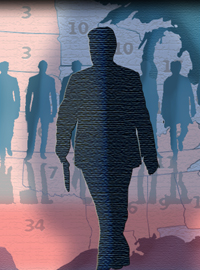
|
The problem isn’t that Republicans don’t have one perfect candidate. The problem is that elusive candidate’s traits have been distributed among roughly two dozen candidates.
|
|
| The Republican Party has a problem on its hands; that is, at least if you believe the mainstream media’s diagnosis of the GOP’s future. Though official announcements are still virtually non-existent, the press has already weighed the candidates in the 2012 Republican presidential field in the balance and found them wanting. Despite President Obama’s political vulnerability, they tell us (and remember that these were the people who spent the last two years attempting to establish Obama’s invincibility), the Republican Party is yielding a crop of also-rans unable to produce a candidate capable of deposing a battle-tested incumbent.
To a certain extent, this is little more than the navel-gazing of a political press corps frustrated that the next presidential cycle hasn’t gotten off to the same turbo-charged start as the last one, where would-be presidents were making it official in the winter of 2006-2007. It’s also an example of typical media myopia. With the exception of 2008, it’d be hard to find many presidential fields that weren’t immediately greeted as inadequate by a cynical press corps.
Still, there’s some truth to the fact that no obvious front-runner is forthcoming from the current field of candidates. But the problem isn’t that Republicans don’t have one perfect candidate. The problem is that elusive candidate’s traits have been distributed among roughly two dozen candidates, some of which aren’t even likely to make the race.
An ideal Republican presidential candidate would have the foreign policy acumen of former U.N. Ambassador John Bolton, the economic mastery of Wisconsin Congressman Paul Ryan and the reverence for traditional American values of former Alaska Governor Sarah Palin. To put flesh on these policy bones, he would have the military record of General David Petraeus, the business success of former Massachusetts Governor Mitt Romney and the years in the pulpit of former Arkansas Governor Mike Huckabee.
Of course, temperament reigns just as large in the presidential equation as biography. The ideal candidate would have the capacious intellect of former Speaker of the House Newt Gingrich. He would have the plain-spoken clarity of New Jersey Governor Chris Christie. He’d have Huckabee’s natural talent for folksy charm and an easy one-liner. And he’d have Texas Congressman Ron Paul’s unshakeable commitment to principle.
Then there’s the way he’d do his job. He’d have Mississippi Governor Haley Barbour’s razor-sharp political insight (Barbour was Ronald Reagan’s political affairs director in the White House and served as chairman of the Republican National Committee during the revolutionary year of 1994). He’d have the flair for competently managing even the most granular task of governing exhibited by Indiana Governor Mitch Daniels. He’d have Christie’s appetite for bold initiatives pursued with indefatigable initiative. And he’d have a communications style that mixes Gingrich’s brain with Huckabee’s heart.
Unfortunately, that candidate won’t be on the ballot in 2012 or likely in any other year (though one not too dissimilar received the Republican nomination in 1980 and 1984). But as the primaries unfold and the candidates do rhetorical battle, each will have a chance to observe the others’ virtues up close. Hopefully they’ll learn something. And as iron sharpens iron, so shall a Republican nominee be forged in the crucible of the campaign. |


